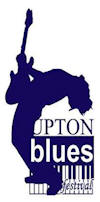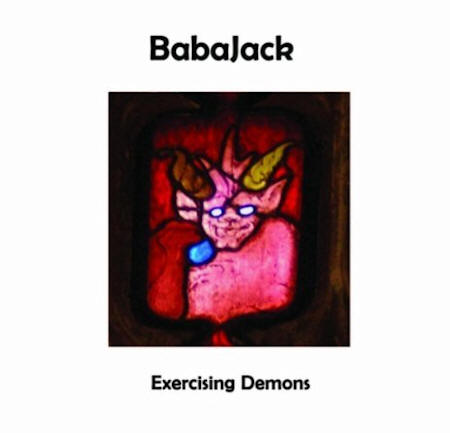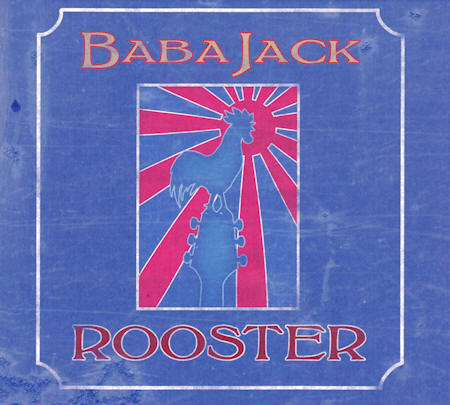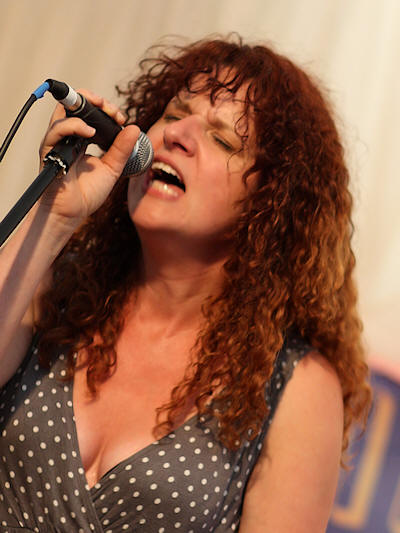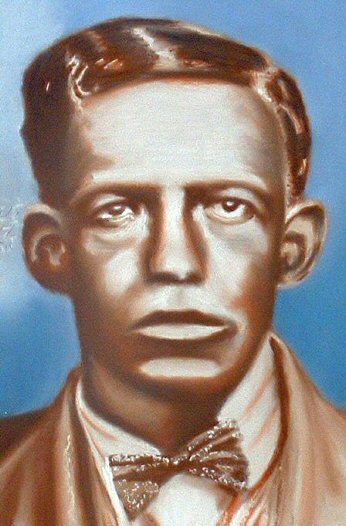
Painting © 2004 Loz
Arkle
Website
© Copyright 2000-2011 Alan White - All
Rights Reserved
Site optimised for Microsoft Internet Explorer
Early Blues Interview
|
|
"BabaJack's sound combines slide, acoustic
and 'winebox' guitars and harmonica from Trevor Steger with tribal
rhythms, African drum, stomp, cahon & beautiful vocals from Becky Tate
and double bass from Marc Miletitch. Trev and Bec met each other
after well travelled lives (from Africa to Soviet Russia!) and have
settled in Malvern, Worcestershire. Both experienced musicians, this
couple is very special: not only do they share their lives, children and
all, but they have the closest musical partnership. Their song writing
reflects all they have, and all their varied influences. It is their
powerful songs, their musicianship and sheer passion and energy that
means they are always asked back wherever they go". "Rhythm, power and
sheer groove makes their brand of blues, roots or folk - whatever you
call it - addictive!" "They groove like
demons! [...] BabaJack's blues is no musty old thing [...]. They play
something more akin to rock blues, but acoustic. It seems that whatever
they do and whatever you call it, it's an instant party" "When they are on stage
everyone sits up and takes notice, they have great presence and energy
and it is hard to contain the fire and passion emanating from them"
_________________________________________________________________________ Following on from the most successful Acoustic Stage (organised by Bec and Tev) at Upton Blues Festival, we called in to see them at their home in Malvern, Worcestershire: Alan: Where do you both originate from and what are your earliest musical memories? Bec: Iíve moved around a lot, my motherís French and my fatherís English and my first earliest musical memories is that my Dad only had two pop records when he was young. He was into classical music but not at all into pop music but he had records of the Beatles and of Big Bill Broonzy. Trev: I come from Cheltenham and my mother was a singer in a band so my first memories are of her singing songs around the house. Looking back on her record collection it was vast, early rock and roll, country & western, all sorts of stuff. Alan: Did you come from musical families - is there a long musical heritage? Bec: A lot of my French family play but Iím the only one thatís turned into a musician. Music has always been there, part of the fabric of my life. Trev: Iím the only one in my family that plays an instrument although my mother was a singer. Alan: Did you always want to become a musician/singer?
Trev: I started playing bass in a punk band at school, I thought it must be easier because it only had 4 strings. When I got older I was in rock bands, but never a blues band, then I decided to sit down and learn guitar. Alan: How did you get started in music together? Trev: I was playing with a mutual friend of ours in a blues duo, after my wife had left me so it came from the heart! Iíd been travelling, been to Africa, learning guitar, etc and I started playing with my friend in Tewksbury and then Becs came along and played drums. Bec: Our mutual friend just said, ďBring your drums down and letís see what happensĒ. It was a fireworks party and, ten years later, here we are! Alan: What kind of material were you playing then? Bec: My musical background isnít really blues-based and Iíve played all sorts of different things. I lived in London for most of my 20s and I lived in Brixton and Peckham and it was a lot of roots music, African, reggae, that kind of thing. I have always had an ear for the kind of folky singer-songwritery kind of thing. I was playing then with my ex-husband in London and our music had a lot of groove and rhythm and blues was on the periphery but it wasnít a central thing. It was actually on our first date that Trev said ďCome on over to my place and listen to some music. Trev: Like you do! Bec: He really did and we spent the evening drinking whisky and listening to music but it was a real launch pad. It was Trevís love and grasp of blues that drew me in.
Trev: I was playing in a punk band and in the late Ď70s I went to see in Nine Below Zero who were doing their Donít Point the Finger at the Guitar Man tour, playing in Cheltenham, and it just blew me away. Next day I bought a harmonica but didnít know how to play it so I went to the local second-hand drift-in record shop and got Sonny Boy Williamsonís Portrait in Blues and a country harmonica compilation with Dr Ross, Sonny Terry and stuff. I remember going home, lying on the bed in the dark listening to this and it just blew me away. I was used to the energy of punk and new wave but then this blues music had the same kind of energy but coming from one man just sat there by himself and they werenít really too far apart. It was all rootsy music, telling stories. So then I worked out on the guitar and when all my mates were there playing punk I didnít dare tell them I had my harmonica in my pocket. Alan: Whoís influenced you the most in your music writing and playing? Trev: I like Furry Lewis, Charlie Patton, Robert Johnson, all the early guys really give me a buzz. Bec: But then the African stuff has also had a big influence, like Taj Mahal and Ali Farka Tourť. Blues-wise, itís got to be Mississippi John Hurt without a doubt. We come from a diverse musical background and we absolutely write together. There isnít a song that one or the other of us can say, ďI wrote thatĒ and by the time weíve finished writing we canít remember whoís written what. Itís such a close knit thing that we do and of course because we live together we play all the time and we just tinker with things. Itís part of life and its such good fun. Itís a rich life and I feel really lucky to do this. So in terms of our musical influences itís a real mish-mash but there are certain things that you hear, like Taj Mahal, Eric Bibb, John Mayall and Texan blues guitarist Chris Whitley. Trev: I had loads of John Mayall when I was first learning, and he mentions J B Lenoir, and I looked JB Lenoir up, and the road goes further back. Bec: I hear things and I listen and I enjoy listening to say Deborah Bonham, who is far from what I do, but I listen and there's things that she does that I could do, that thing she does at the end of a line or something like that. Trev: Another nice thing is that if I come up with a couple of riffs and have a couple of fairly typical lines, then Becs comes in and puts something completely different on it that really just takes it on. Alan: Looking back on your careers so far, what are your fondest memories? Bec: The achievement of creating two albums and being ready for the third is really big for us, they are kind of milestones in themselves. Trev: The travelling has been great too, weíve been to Switzerland to play, to France, all on the back of a guitar. It feels like somebodyís suddenly going to say, ďOiĒ and drag me off the stage and find out I can't do that. Bec: We ended up in a place in Oxford and he gave us the bridal suite so we were lying in a magnificent four poster bed thinking, ďNot bad for just writing a couple of songsĒ. Weíve had some really fantastic festival experiences, the Upton Blues Festival this year was awesome, it was great fun, the Skegness Rock & Blues Festival this year was really incredible but I also actually enjoy the smaller gigs. We played the Belle Vue in High Wycombe which is a little pub in the back streets of nowhere, in a little residential area not in the centre of High Wycombe, and the atmosphere was just fantastic, it was electric. It was a small pub, you couldnít pack more than 30 or 40 people in the area we were playing in, but it was just one of the best nights ever.
Itís one of the joys of blues music; itís a simple form but you never stop learning. We have kids who buy CDs, we have people in their 20s as well as the age group that youíd perhaps expect to be into blues, and I think itís because it touches something, itís got a rhythm and repetition and I think that just cuts through. People can listen and then say, Well Iím not really into that kind of music but I had a really good time, and I love that. Alan: Can you tell me a bit about the myriad of instruments you both play, and what's your favourite instrument? Trev: I play acoustic guitar and resonator guitar and Iíve also started in the last few years playing winebox guitars. Making them and playing them actually. I first saw this when I lived in Zimbabwe for three and a half years years teaching woodwork with the VSO and all these little kids were walking around playing these handmade goatskin guitars strapped onto a pot, or petrol can guitars. We brought these into our sound to get a bit more raunch to it. I also play the rack harmonica with a little microphone thing that Iíve made so Iíve been selling a few of these at gigs.
Alan: How did the name 'BabaJack' come about? Trev: I was living in Zimbabwe in a tribal trust area [land apportionment zones which were held in trust for indigenous peoples on a collective basis], for three and a half years with my first wife, in the bush with no electricity or plumbed water or roads, teaching woodwork. We had our first son there under a paraffin lamp and his name is Jack. In the African Shona culture you take your sonís name so I was known as Baba-Jack (the 'father of Jack') and I thought ďOoh, thatís a good name for a band somedayĒ. Alan: You usually play as duo but sometimes expand to a trio or a full band. Tell me about the other musicians and their backgrounds. Bec: The main person is Marc Miletitch and heís a classically trained double-bass player and has incredible technical ability on double-bass. He played on our second album and he was actually playing in another band at the time so we had a couple of other bass players in between times but then the stars aligned and heís now joined us properly as a full time member of the band. Then we have other people who come in who do some backing vocals, with fiddles sometimes although none of them are full time. We have a lot of really great musical friends. Trev: What weíve also found is that because Becs and I have done all the writing weíve found it hard to get other musicians in and to be able to tell them to do what they want with their own instrument but leave the writing to us. With Marc itís just perfect, he wants to do the arranging and play his bass and we do our thing so the dynamics work. Alan: Are there any particular songs that you play that have special meaning to you? Bec: Well, all of our songs, but we do play some covers and those that we pick have special significance for us. One of the ones we really enjoy playing is Black Betty which people really enjoy as a great party song but itís also because one of the great musical expansions for me was properly discovering Leadbelly and his version of it was the earliest known recording so tipping my hat to him is quite important. Trev: His version of Black Betty on YouTube is just beautiful. Thereís a song I wrote called Daddyís Gone but sometimes when I play that it invokes something deep, even though my fatherís still alive. Iíve almost welled up sometimes!
Bec: Exercising Demons has been extraordinary for us. It really took us to the next level. It was in the top albums of 2010 for BluesMatters and Blues in Britain. Weíve had a lot of radio play from it, weíve had some fantastic reviews from it and it really brought together the sound that we were trying to put together. But we are very close to starting to record the third album so all our energies, excitement and enthusiasm are now focused on that album, which is as yet unnamed but weíve written most of it. It's going to be a lot more bluesy. Itís a different kind of approach, thereís not going to be any kick drum in it , itís going to be all percussion. Itís going to be very immediate and rootsy and very much that kind of rhythmic push with a lot of winebox guitars. Again, itís another move towards that sound we are looking for. We seem to have one foot in folk and one in blues, although it seems like the bluesy thing is now opening up for us and we feel comfortable, although the folky thing is still important. We are neither of us folk fans, we don't come from a folk background. It's really we like roots music and also what we do both have in common is acoustic music, being in the blues scene playing acoustic music it's easy to be seen as being folky because we're not electric. Although it's hard to describe. All of our songs start from the blues with a strong rhythmic basis. I'm certainly not a 'blues shouter', so perhaps that's what gives it a more folk element. Alan: To me there's a lot of Leadbelly coming out with the range of what you do. Bec: If you listen to the old country blues, it's folk music in effect. Alan: How do you see the future of blues music?
Trev: To have people like Seasick Steve, Laura Marling, Mumford and Sons, playing acoustic on the main stage at Glastonbury and getting Brit Awards and having some influence opens the doors to much wider audiences and people are starting to come back to these musicians because they are real and good. That's really exciting. Alan: What are your future plans? Bec: Weíve got this new album that we are doing, we are playing a lot more and things are really growing for us. Weíd like to do more in Europe, we might get signed in the very near future (but we arenít allowed to mention that! - See note below). Itís really noticeable that there has traditionally been more government money in Europe for festivals and the arts and they treat us really well, but in this country itís always been run more by volunteers and lovers of the art on a shoestring but thatís actually made it recession-proof to some degree in this country. It feels very vibrant and it feels like itís really happening over here for us. Alan: Thank you very
much indeed. Note:
Check out BabaJack at the Upton Blues Festival 2011
_________________________________________________________________________
Return to
Blues Interviews List |










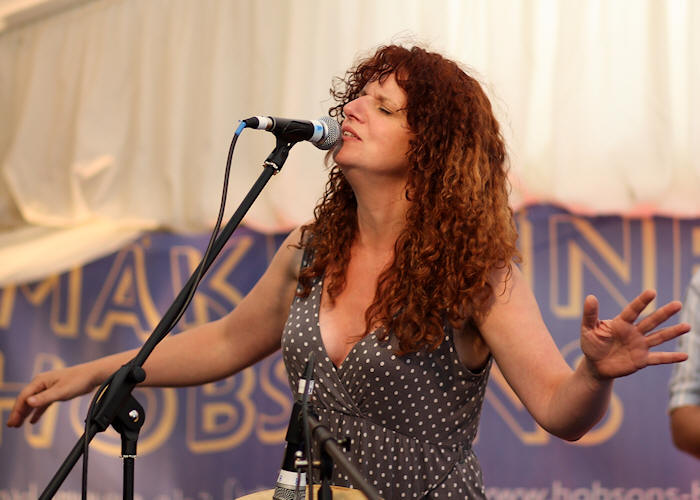
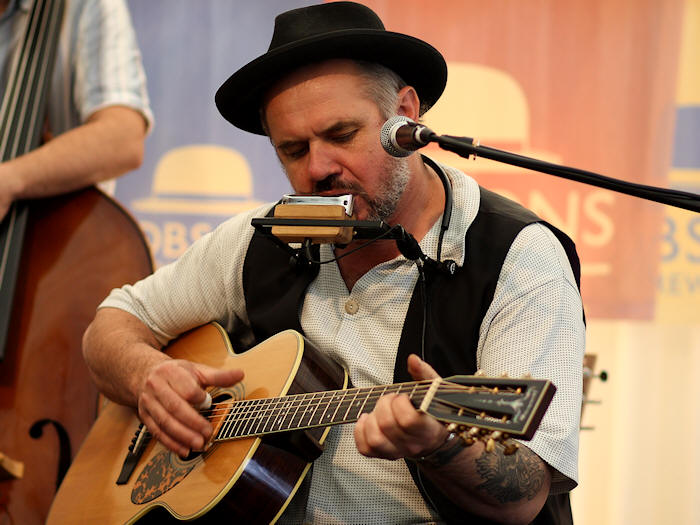
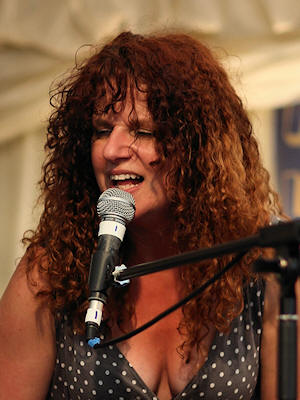 Bec:
When I was 13 my mother introduced me to a Russian folksinger and she took
me to see them play. It didnít really form my music but I think it did
form that I love acoustic instruments. They were really great players
and I remember being 13, looking at these guys and thinking, ďThatís
what I want to doĒ.
Bec:
When I was 13 my mother introduced me to a Russian folksinger and she took
me to see them play. It didnít really form my music but I think it did
form that I love acoustic instruments. They were really great players
and I remember being 13, looking at these guys and thinking, ďThatís
what I want to doĒ.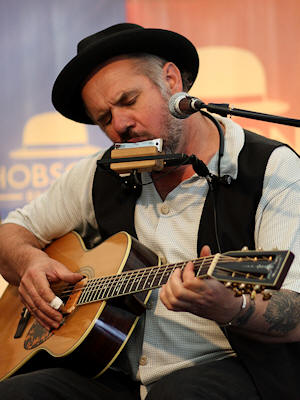 Alan:
What first attracted you to the blues Trev?
Alan:
What first attracted you to the blues Trev?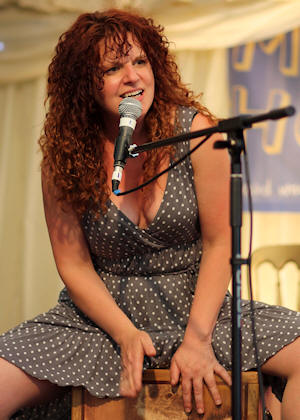 Bec:
Trev is a woodworker so he makes furniture as well as all these
amazing instruments. I play a variety of percussion drums, an African
drum called the Djembe, and I have a stomp box which I got courtesy of a
Seasick Steve connection. We played Glastonbury in one of the little
tents about three years ago and there were two people playing that I
really really wanted to see, one of them was a guy called Xavier Rudd,
an Australian, multi-instrumentalist who draws on Aborigine stuff and
the other person I wanted to see was Seasick Steve, and they were
playing one after the other. We got to the stage to see Xavier Rudd and
the first thing that happened was Boom, Boom, Boom, and it wasnít
actually the stomp box, it was the bass drum of a drum kit and the whole
crowd was going ...(What Iím doing here, for the tape, is bouncing!).
Everybody was just drawn by this very primal rhythm and this very bassy
sound. Then we legged it right across Glastonbury to go and see
Seasick Steve at the end on a different stage and guess what he started
with....Boom, Boom, Boom. What he calls the Mississippi drum machine.
And I just thought ďI want one of themĒ, so Trev made me a stomp box
which is a microphone in a box and EQ to get that sort of dull thud. I
also play a Cajůn which is a box drum which was inspired by the guys
playing packing cases on the harbours so you literally sit on the drum
and bang it. And I sing as well as lead vocalist. So we keep ourselves
well occupied. And we have lovely Marc Miletitch from Paris who plays
double bass for us.
Bec:
Trev is a woodworker so he makes furniture as well as all these
amazing instruments. I play a variety of percussion drums, an African
drum called the Djembe, and I have a stomp box which I got courtesy of a
Seasick Steve connection. We played Glastonbury in one of the little
tents about three years ago and there were two people playing that I
really really wanted to see, one of them was a guy called Xavier Rudd,
an Australian, multi-instrumentalist who draws on Aborigine stuff and
the other person I wanted to see was Seasick Steve, and they were
playing one after the other. We got to the stage to see Xavier Rudd and
the first thing that happened was Boom, Boom, Boom, and it wasnít
actually the stomp box, it was the bass drum of a drum kit and the whole
crowd was going ...(What Iím doing here, for the tape, is bouncing!).
Everybody was just drawn by this very primal rhythm and this very bassy
sound. Then we legged it right across Glastonbury to go and see
Seasick Steve at the end on a different stage and guess what he started
with....Boom, Boom, Boom. What he calls the Mississippi drum machine.
And I just thought ďI want one of themĒ, so Trev made me a stomp box
which is a microphone in a box and EQ to get that sort of dull thud. I
also play a Cajůn which is a box drum which was inspired by the guys
playing packing cases on the harbours so you literally sit on the drum
and bang it. And I sing as well as lead vocalist. So we keep ourselves
well occupied. And we have lovely Marc Miletitch from Paris who plays
double bass for us.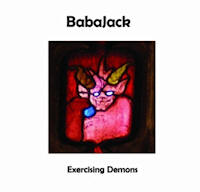 Alan:
Tell me about your latest album 'Exercising Demons'.
Alan:
Tell me about your latest album 'Exercising Demons'.